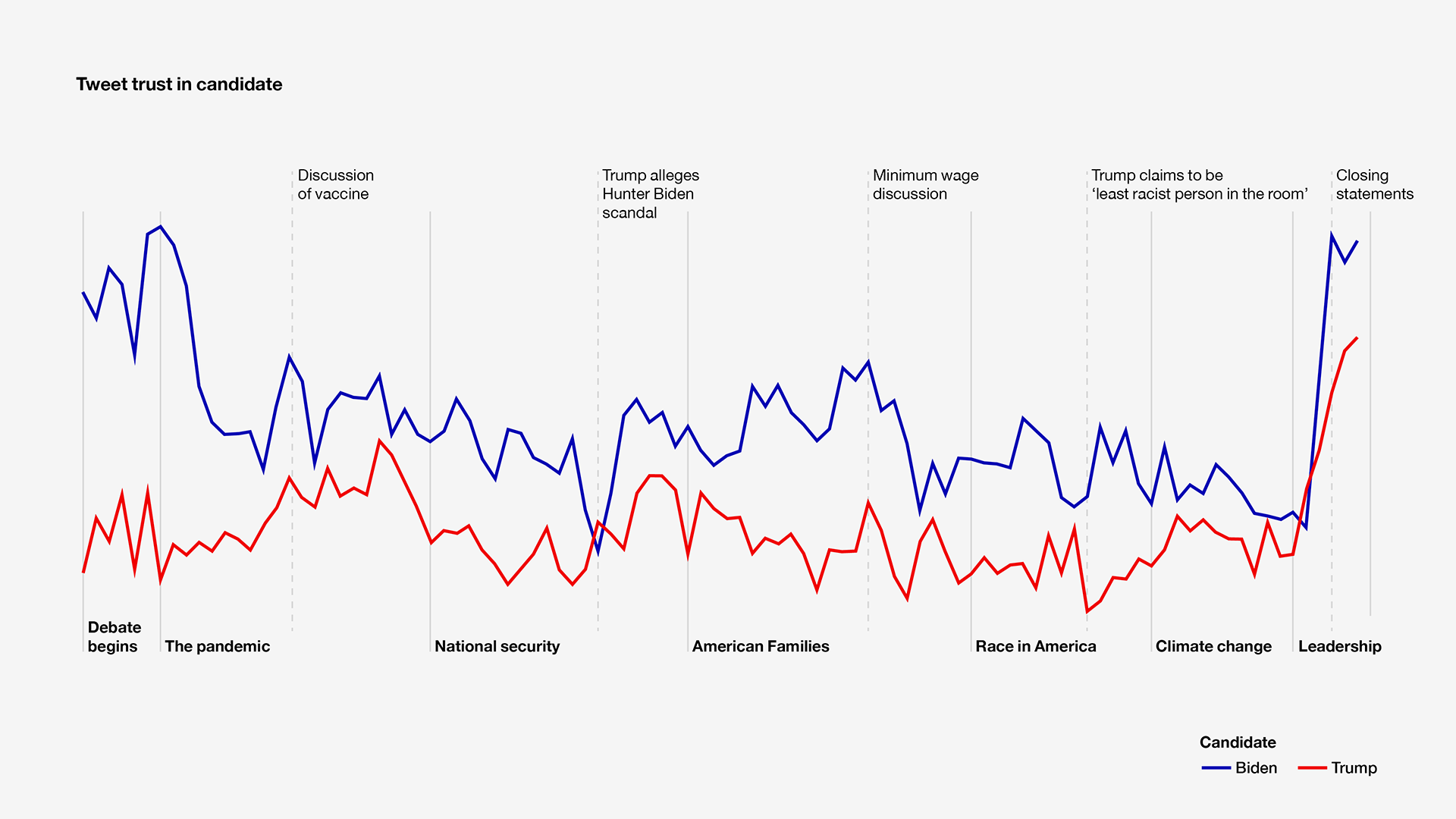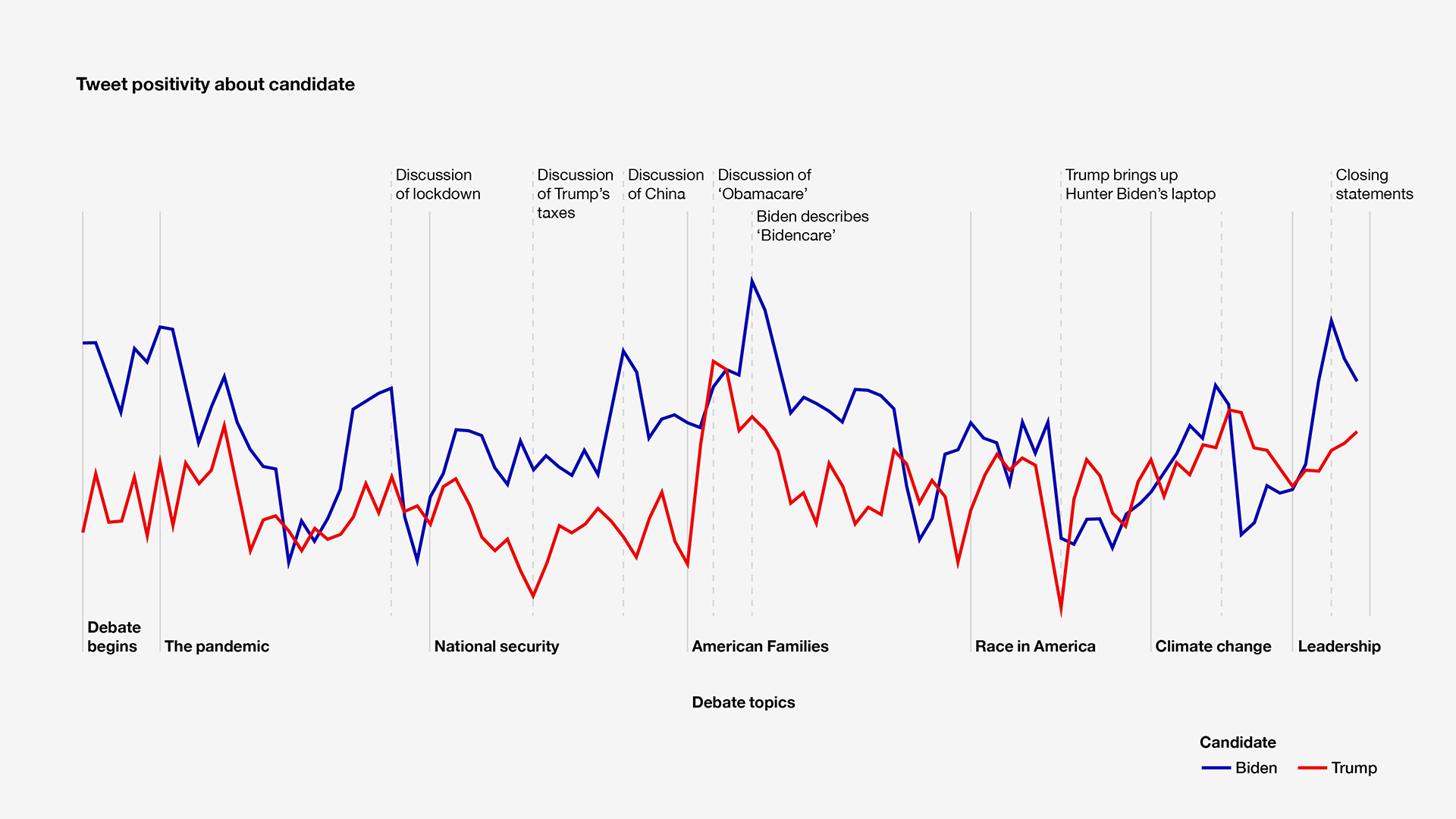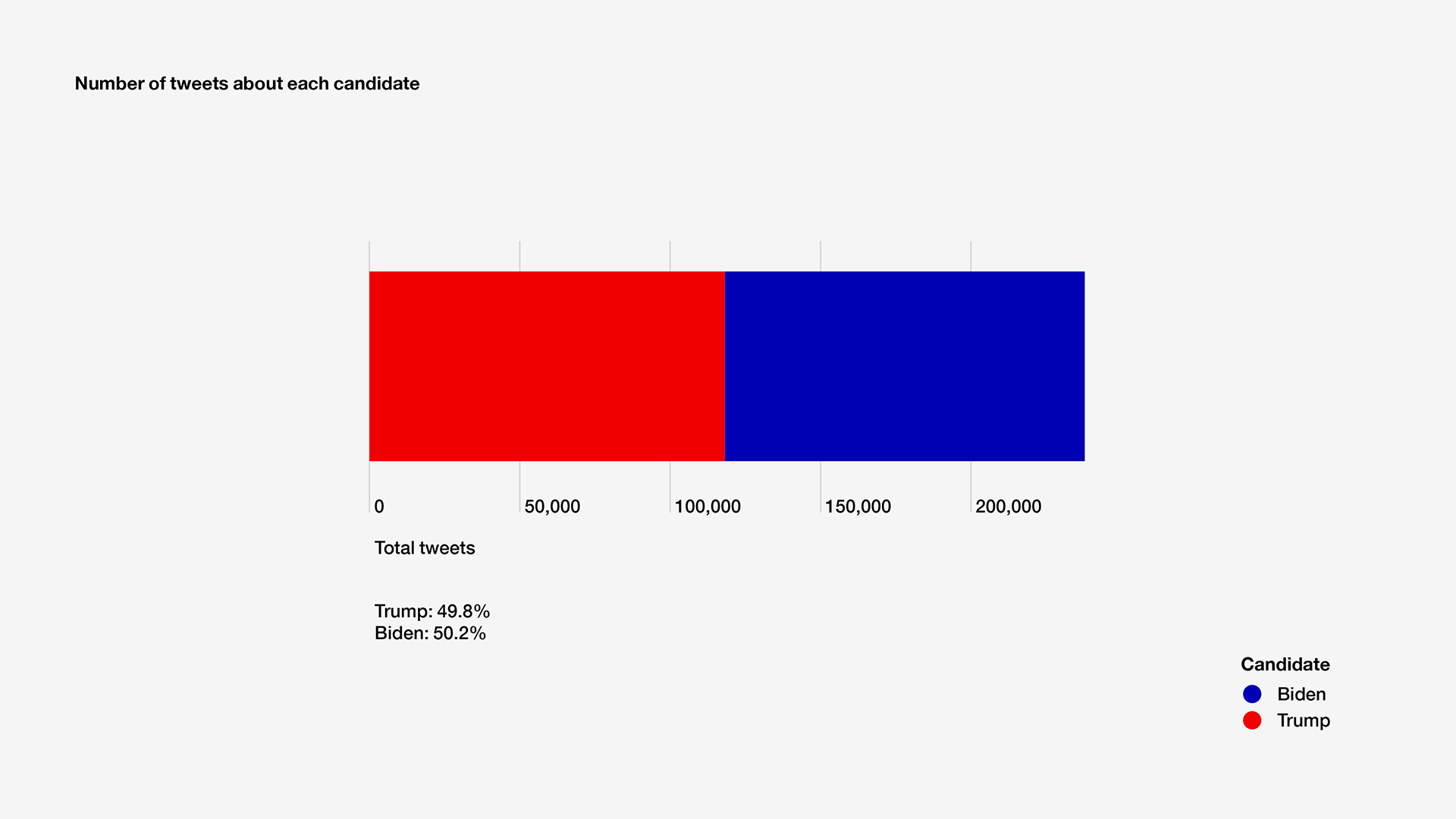AI analysis of tweets indicates Biden won the final debate, Americans distrust Trump

Our analyses of Twitter's live response to the final presidential debate indicate a clear winner. Across topics, Twitter users wrote about Joe Biden's debate talking points in a significantly more positive, trusting manner.
We analysed hundreds of thousands of tweets made during the final presidential debate. Tweets made during the debate revealed surprising insights about how the American people responded to the candidates during their final encounter before the election. The results suggest that Biden emerged with a clear win.
President Trump’s interruptions during the first debate were widely viewed as causing one of the largest post-debate poll drops in recent memory (see our blog post, which tracked this drop using measures of tweeters' positivity toward Trump). Trailing in the polls and in need of a win last night, he entered the final debate with a more respectful strategy. Biden again tried to present a reasonable alternative to a President whose character many feel makes him unfit for office.
Which strategy won?
We analysed every tweet made during the debate that mentioned either candidate’s Twitter handle (@realDonaldTrump or @Joe Biden). Our analysis indicates that Biden was the clear victor - he came out on top in our measures of both positivity toward and trust in each candidate.
Analysis methods
Over 238,000 tweets were processed with AI algorithms trained to predict how people felt about the candidates. The algorithms estimated two things: trust and positivity. High trust indicates that people tweeted about candidates in a trusting way, while high positivity indicates people tweeted about the candidates in a positive way.
The debate focussed on 6 topics: handling of the COVID-19 pandemic, national security, American families, race in America, climate change, and leadership. By looking at how trust and positivity changed over time, the analysis shows how people responded to each candidate’s handling of these topics as they discussed them over the course of the debate.
Debate topic: COVID-19
The moderator, Kristen Welker, asked both men about their plans on how to deal with the ongoing pandemic.
Biden stuck to familiar ground, hammering Trump for the death toll to date, and promising a comprehensive plan, including increased testing and stricter regulations around mask wearing. Trump attempted to diffuse responsibility, calling the pandemic a worldwide phenomenon, blaming China’s poor initial containment of the virus, and promising that a vaccine would be announced within weeks.
People tweeted about Biden’s discussion of the pandemic more positively and in a more trusting way, and while both candidates enjoyed favourable responses during their discussion of a potential vaccine, Biden was clearly the more trusted candidate through this section of the debate. This is perhaps unsurprising given that his handling of the pandemic is one of Trump’s weak points.

Debate topic: National security
Welker asked both candidates how they would deal with threats to the US election integrity from malicious foreign actors such as Russia and Iran.
Biden promised that under his administration any attempt to interfere with American sovereignty would be met with a strong response. Trump responded by accusing Biden of allowing Russia to invade Crimea under his watch during the Obama administration.
The exchange devolved into an extended discussion of both candidates’ alleged financial entanglements with foreign interests. Biden focussed on Trump’s businesses abroad, and Trump attacked Biden over the influence-peddling scandal surrounding Biden’s son, Hunter.
The analysis suggests Biden won this exchange: Trump’s positivity dipped notably when Biden accused him of refusing to divulge his tax returns, and when discussion moved to the candidates’ involvement with Chinese interests. This is bad news for the incumbent, who has been trying to make the Hunter Biden story stick to the former VP, while attempting to downplay his own potential conflicts of interest.
While trust was generally higher for Biden during this section, it dipped when Trump brought up the Hunter Biden scandal, indicating some of the President’s punches may have landed. On balance, though, Biden came out on top through this topic.

Debate topic: American families
Welker chose to focus on healthcare, asking both men what their plans would be if the Supreme Court overturned Obamacare. Trump attempted to both distance himself from Obamacare, and take credit for his successful administration of it. Biden promised to reduce premiums by allowing Medicare to negotiate with drug companies, and promised to pass “Bidencare” -- Obamacare with a public option.
While both candidates enjoyed positive reception to their healthcare messages, Biden’s most positive reaction of the night corresponds with his mentio of “Bidencare”, indicating that the Twitterati enjoyed this messaging.
Trust through this topic also told a compelling story of support for Biden. While both candidates enjoyed a bump as discussion turned to a $15 minimum wage, Biden’s was clearly higher. This indicates that Biden’s support of a $15 minimum wage won trust from tweeters. This is probably a win for the challenger, especially considering this was the most tweeted about moment of the debate.
Biden’s support of a $15 minimum wage won trust from tweeters... and it was the most tweeted about moment of the debate.
Debate topic: Race in America
Welker asked both men to speak directly to families of colour who have to bring their children up facing discrimination and unfair treatment at the hands of the police.
Biden attested to his belief in the reality of institutional racism in America, and spoke of the need to live up to the ideals outlined in the Declaration of Independence. Trump focused on Biden’s support of the 1994 crime bill, which enacted mandatory minimum sentences that many argue have resulted in disproportionate imprisonment of African Americans. Trump closed by stating that no one -- with the possible exception of Abraham Lincoln -- has done more for African Americans than him.
The audience did not agree. While positivity scores indicate neither candidate had a clear edge in this discussion, Trump’s lowest point in the night came when he changed the subject mid-discussion and tried to score points by again bringing up Hunter Biden. Trust told a similar story. His trust scores dipped -- and Biden’s rose -- when Trump claimed to be the “least racist person in the room.” American’s appear to be tired of the President’s bombast and his attempts to tar his opponent with the Hunter Biden scandal.
Trump experienced lows in positivity and trust when he changed subject mid-discussion and tried to score points by again bringing up Hunter Biden. American’s appear to be tired of the President’s bombast and his attempts to tar his opponent with the Hunter Biden scandal.
Debate topic: Climate change
Welker then asked both men how they would fight climate change while protecting the economy. Trump spoke of his unwillingness to sacrifice American jobs because of the Paris Accord, while Biden characterized climate change as an “existential threat,” and argued that the planet cannot afford four more years of President Trump’s regressive climate policies.
Positivity scores did not differ much between candidates during this section, but Biden’s trust scores edged out Trump’s, indicating Americans may have been more receptive to the challenger’s message.
Debate topic: Leadership
Welker gave each candidate one minute to imagine what they would say on inauguration day to Americans who had voted for their opponent. Trump tried to emphasize his economic leadership, and painted a dark picture of economic recovery under a Biden administration. Biden tried to give a message of unification, promising clean jobs and prosperity. He closed by saying that what is on the ballot is the American character, adding that Americans have missed decency, honor, and respect under President Trump.
Tweets about Biden were more positive during his closing statements than Trump’s, suggesting voters were more receptive to Biden’s message of unification than to Trump’s message of fear. While both candidates enjoyed a bump in trust as they closed out the debate, Biden’s was again higher.
Tweets about Biden were more positive during his closing statements than Trump’s, suggesting voters were more receptive to Biden’s message of unification than to Trump’s message of fear.
What does the analysis reveal about the 2020 presidential contest?
Most importantly, Biden’s lead seems to be holding steady. Biden's popularity may be reflected in his slight edge in tweet volume during the debate. Trump has traditionally dominated discussions on Twitter, taking home the lion's share of tweets about American politics over the past four and a half years (see our blog post showing his dominance - albiet negatively tinged - of tweet volumes about the first debate).

While Trump appeared to have tried to act in a more presidential manner, the analysis indicates he still struggled to match Biden in terms of trust and positivity, two important drivers of voter intention. Lagging in the polls, Trump needed a clear win in the final debate, and it is not what he got. Of course, he has a highly energized base which may not be visible on Twitter––and this base upended pollsters’ predictions in 2016. Will they do the same in 2020? Twitter data tends to suggest this is unlikely, but we won’t know for sure until the ballots are counted.
For queries on Texture Trust Hunter, the technology underwriting this analysis, please contact us via the email address below.
Contact: human@texture.ai